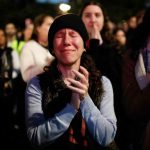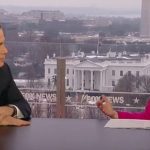Cessnock woman Louise Ihlein took aim at UNSW economist Gigi Foster and The Australian’s economics editor Adam Creighton on Thursday night’s show. Both have argued that lockdowns do more harm than good.In a video question, Ms Ihlein said the pair had suggested “when people get to 60 their life is pretty much done” and that the “first time I clapped eyes” on Ms Foster “I burst into tears”.“It was awful,” she said. “I was so upset and I wrote so many angry emails to the ABC. And then I have seen Adam a couple of times last year on The Drum and on Twitter saying similar stuff, about the fact that his dad was 65 and he would be OK to be done. That’s disgraceful. It was just disgraceful. People aren’t worth anything. We’re not a commodity, people, we’re not.“I want to know how they live with themselves? And considering that I’ve just turned 60 and I’ve got an illness I’m not going to get better from, I want to know, do they want me got rid of? “I hope as they travel through life they never have to be thought of as the other. And I want to know how they propose we give sick and disabled people a better life, a good life?”RELATED: ‘More young people’: Scary COVID threatCreighton responded that he was being verballed.“Well firstly just on that last point about 65 and saying about my dad — I never said that, that was actually someone else,” he said.“So I think it’s very important to check facts when you’re making those sorts of points. But look, we never said that once you hit 60 that’s it, you’re not worth it. That’s obviously a shocking claim and neither of us would never make that. “All we’ve been arguing was for what was the consensus view of science at the end of 2019, which is you take a rational approach to a pandemic and you don’t shut everything down and don’t force people to do things and don’t drag them screaming from cars at the border, you don’t shut the borders and don’t close hospitals to all other patients for months on end, you don’t end travel.“All these things are so extreme, suspensions of our liberty for long periods of time. I’m no extreme libertarian at all. But this is extraordinary what’s happened in the past year. We’ve been arguing, let’s have a sense of proportion here.“I personally think the world has lost its mind a bit over COVID. We’re all going to die of something. There are risks every day we have to deal with. We normally deal with them as a society. Three million people every year die of respiratory disease. Millions die of cigarettes around the world and we don’t ban them.”RELATED: State to allow international flights againMs Foster said it had been a “very interesting year”, and that she had been “defamed on Twitter” after her last Q&A appearance.“As a social scientist who studies groups and societies and what makes us tick, this was an amazing opportunity for me to see people in action completely spellbound on a particular thing that can hurt people, which is COVID, and forgetting about everything else that matters in a normal time,” she said.“And I was prepared to call it out and I’m proud that I did because there were very few voices in Australia who were telling a sensible, sane story despite the hysteria gripping the world.”Ms Foster stressed she would “never say COVID is not a dangerous disease, absolutely it is”.“I never said after 60 somebody’s life is not worth living, I would never say that,” she said.“My arguments have always been, from the beginning to the end, we need to do what’s best for human welfare as a whole. Human welfare is not determined solely by whether people are suffering and dying from COVID. National Vaccine Rollout“It is determined by how mentally healthy they are — which they’re not when they’re shut up inside, unable to see their family and friends — how well the economy is doing, because that predicts how much the government can spend on things like hospitals and schools and infrastructure. It has to do with suicide of our young people who have been locked out of schools and jobs, it has to do with people who go bankrupt and have more house problems and all the crowded out healthcare that didn’t happen because we were so pathologically focused on COVID. “So my story of the world of what’s happened this year is that the world went mad. I continue to say something sensible and I’ll be proud to have served Australia in that way.”Host Hamish Macdonald started to ask a question about COVID deaths, but Ms Foster cut in that she wanted to talk about total deaths overall.“I want to ask about COVID deaths,” Macdonald said.“Why?” Ms Foster hit back. “Do you know how many people die in Australia from something else? Every day we lose 300, 400 people. In total from COVID we have lost fewer than 1000. And for that we have gone hundreds of billions of dollars into debt. “We have now amazing crazy numbers on GDP. We have gone back 2.6 per cent last year and normally we go forward 4-5 per cent. That brings us further back on the trajectory of growth. GDP is not a perfect number but it’s something we can compare. We have compromised our future.”But author Bruce Pascoe argued that “trajectories of ever-increasing growth” were unsustainable.“Can the world sustain that? Are we always going to assume our wealth will get greater, production will get greater?” he said.“What about the poor old earth? She can’t sustain this and we assume with our ever-increasing industrialisation, and our ever-increasing population, which no one wants to talk about, that we can just keep on going at this escalating rate. And we can’t. And we have to address it.”Pascoe, whose book Dark Emu explores the history of Aboriginal agriculture, said Australian political history was “120,000 years old at a minimum”.“We have probably got the oldest village on earth in this country, which meant we invented society and that society for 120,000 years was largely egalitarian,” he said.“I think this is a triumph and I think we need to refer to it more and more frequently and stop looking at the cycle of news as if this is the world. It is not the world. The world is in our hearts and it’s what we believe and what we do which are the main things.”ABC journalist Stan Grant said the world’s response to the pandemic, including shutting down at the expense of economies, had “revealed both our strengths and our vulnerability”.“The strengths we thought we had, our interconnectedness, our global economy, the ability to hop on a plane and in 10 hours be somewhere else on the other side of the world, revealed our fragility that we share this place in such close proximity,” he said.Grant said he shared Ms Foster and Creighton’s concerns about liberty.“What did concern me — and I think we need to think long and hard about this — is that in an emergency, when we do surrender freedom, it takes a long time, if ever, to get it back,” he said.“Look at 9/11 after the attacks on the World Trade Centre. There is a reason that The Plague was written. Because the virus of coronavirus or the plague may also carry a virus of tyranny. “And at a time when democracy is in retreat … when authoritarianism in the shape of China in particular is on the rise and resurgent around the world, these things of freedom, these things that bind us to each other, these things that we are meant to hold dear, sacrificed and surrendered are hard to get back.”Sam Mostyn, president of Chief Executive Women, argued that lockdown was beneficial to an extent “because during that period we learnt a lot about ourselves”.“We all slowed down,” she said.“I accept the mental health issues that we have to pay for now. I accept we had to change as a society. You talked about an economy stopping. A lot of people rethought what it meant to be part of the Australian society. “They started to talk about neighbourhood again, and what mattered to us in our relationships with our families. How care (can be) at the centre of an economy instead of the kinds of things we got so obsessed with.”Creighton said those were privileged people “on fixed salaries, good salaries”, and not the hundreds of thousands who lost their jobs.“They got JobKeeper as well, and a huge amount of government (support),” Ms Mostyn said.“That’s insulting,” Creighton replied.Other topics covered by the panel included income inequality, Prime Minister Scott Morrison’s response to the Women’s March 4 Justice movement, housing affordability and the Indigenous treaty negotiations.Renowned economist Thomas Piketty also made an appearance via video-link from France.frank.chung@news.com.auHow to find news on news.com.au
Powered by WPeMatico






